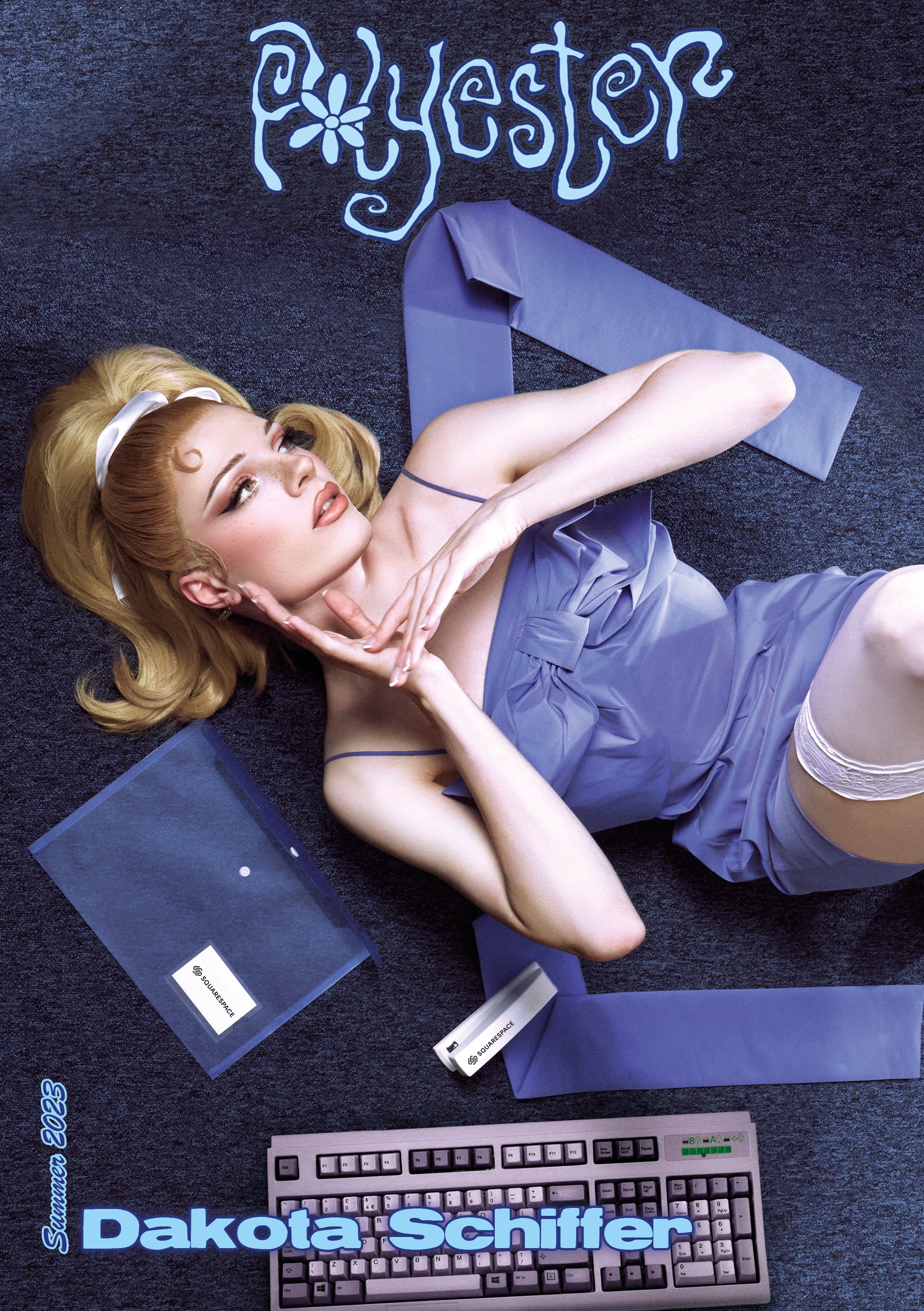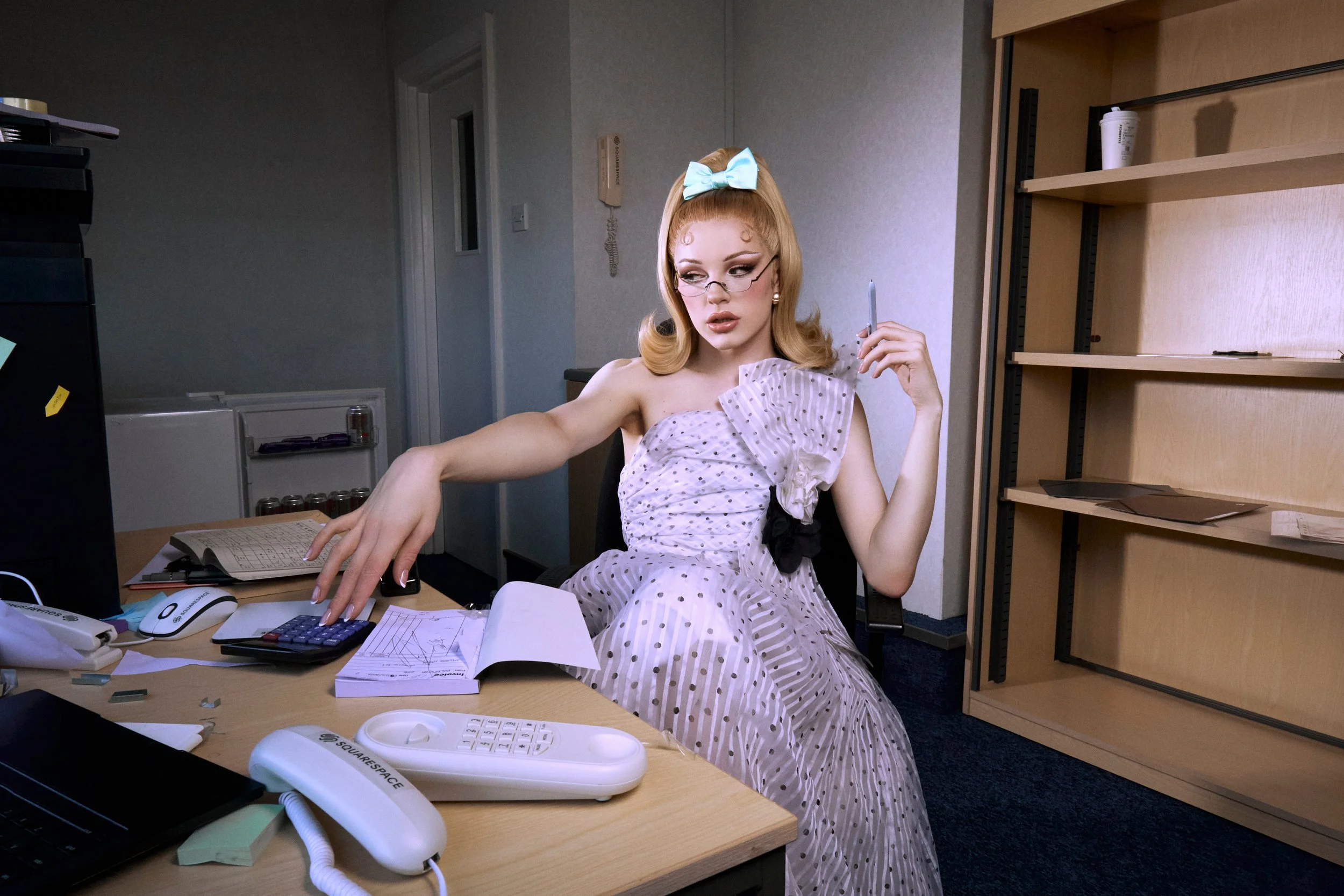Dakota Schiffer on Subtle Drag, Wealth Disparity and Killing the Girlboss
It’s only been just over six months since Dakota Schiffer was introduced to the world. Making her entrance via the stage that hosts all household drag names, RuPaul’s Drag Race - more specifically, Dakota appeared on the fourth season of the UK rendition of the show. It feels especially important to delineate this franchise from the American series, not just because British drag has a notably different sensibility to its stateside cousin, but as RuPaul’s Drag Race UK has no cash prize for the winner, due to being shown on the BBC. This also means that the show has no weekly gifts for the challenge winners, which in recent years on the US show have come in the form of dollars rather than lavish gifts from sponsors.
But with no prize money at stake, why would a queen get involved with the drag competition in the first place? While a few may claim to enter solely due to a love of competing, most are taking part to take advantage of the platform it provides: To reach a global audience, to make a career out of drag, to become a ‘Ru Girl’.
For her turn under the spotlight, Dakota was determined to make not only an impact, but a brand. Over video chat, the 23 year old is uncannily eloquent for so early in the morning, let alone with such a complex subject matter. “I went into the show with a very specific idea of what I wanted to look like,I had a brand and I was very conscious that there's so much Drag Race and so many Ru Girls now, that you need to stand out among them.”
She enthuses, “There are so many drag queens working to get noticed. We’re a dime a dozen, and that’s just the show! There are so many queens that aren’t even on the show,, who are creating top level work too. So I went into the show thinking that if you don't leave a stamp on people's minds, and people can't look at something and associate it with you, then it's very likely that you might be forgotten by that audience. And I knew that the audience was going to be the one that had to propel me to do whatever I wanted to do afterwards, which was creative work and activism, so I had to leave my mark.”
Leaving the show in 6th place, the Horsham native made an impact as not only one of Drag Race’s few trans contestants, but a fashion icon in her own right, following the legacy of the show’s alumni and her personal favourite queens Violet Chachki and Shea Coulee.
Picturing Dakota Schiffer summons shades of mint green and honey blonde hair, accompanied by satin bows and a preference for sixties fashion. These associations were, as she noted, purposeful, which made the critique of her ‘Ru Are You?’ runway in the first episode all the more painful.
“The judges saying ‘we don’t get who you are’ really stung.” She sighs, explaining that the comment rolled around her brain for months. “I kept being told that I wasn’t ‘draggy enough’ and it has really made me question what drag means to me and why I do drag, especially as a trans woman. I had to reckon with what counted as drag to me versus what was drag to RuPaul and Michelle. But it's all so subjective!”
Dakota continues, “The word that Ru used all the time was subtle. Like, 'you're very subtle,' or ‘demure’, or ‘elegant’ and the words that he used to describe me always made me feel like I was being diminished, as if what I was doing was easy or effortless!” She laughs, leaning in conspiratorially, “It frustrated me because I'm like, girl, this isn't easy. I spent just as long getting ready as everyone else, the shapes might not be as big, but the work is exactly the same.”
“We’re all just putting on hair and makeup and painting our faces at the end of the day. We’re all fighting for the same things.”
While Dakota confides that she found herself adapting her makeup and style to what the judges required for success on the show, in the time since she has been leaning back into what she’s always enjoyed most about her aesthetic - a certain kind of soft precision that always holds a unique style reference. What she does find herself thankful for following her stint on international television, aside from the platform, is a newfound confidence in her point of view. In her new spot as a public figure, Dakota has had to leave behind the anonymity of a digital presence made up of posting “pretty pictures online with no sort of spoken content” and reckon with a world that is making it more and more difficult to exist in a queer body.
New anti-trans and anti-drag bills in the States seem to be passed daily. Articles discussing the validity of gender expression are shared across Twitter en masse. As a trans woman who is also a drag queen, the struggle to survive weighs twice as hard on Dakota’s shoulders, even though - as she remarks - Dakota gets off lightly as she appeals to Eurocentric beauty ideals by being white and slim.
“It’s diet facism.” She remarks. “The debate really comes down to policing how people look and how androgynous people present and while we can go into the semantics of labels and community and access to health care and legislation, it boils down to how people can look and what people can wear. And that is drag itself, isn't it? It's just a very exaggerated presentation. We're all just putting on hair and makeup and painting our faces at the end of the day. We’re all fighting for the same things.”
“I don’t agree with girlboss culture: Creativity gives me energy to carry on, it makes me feel like I'm doing the right thing.”
To tackle the negativity, Dakota takes a decidedly positive approach. She divulges how she used to post a lot of political posts, but that being pointedly herself and a happy representation of a trans life well lived has elicited a superior response. Dakota comments that was one of the most common reactions to her stint on Drag Race - not just that her fans were happy to see her succeed, but that it was “refreshing to see a happy portrayal of a trans person living their life on national television, without the context being their identity is up for debate.” A much needed foil to the constant interrogation of trans people’s right to exist on news channels and talk shows.
As well as leaning back into her preference for smaller eyeliner in 2023, Dakota is making a concerted effort to prioritise creativity over girlbossing. Success, to Dakota, is defined by doing creative work that inspires herself and becomes a reference point for other people.
“I don’t agree with girlboss culture: Creativity gives me energy to carry on, it makes me feel like I'm doing the right thing. And, of course, money is a massive component in being able to be creative, but if you want to nap for half the day, I truly believe you should be allowed to do that. And if you need a day off, you need a day off, but some people don't have that choice. Some people don't have access to say they need a break because some people just are hustling because they have no choice. Otherwise they couldn't afford to live. The socio economic state of this country means that rise and grind culture will never really die, it'll just be rebranded and repackaged in a more socially acceptable way.” Dakota elucidates, “Glamourising this kind of work culture just upholds these systems of wealth inequality, it produces a false optimism that things can change for people by working harder. That’s never been the case.”
“It’s a shame we live in a society that celebrates men that reach these outlandish goals so young, but I can’t say it impresses me very much.”
Photos: Yana Van Nuffel
Words: Gina Tonic
Styling: Kate Kidney Bishop
Styling Assistants: Jake Martin + Tudor Covaciu
HMUA: Dakota Schiffer
If you are in the UK, you can sign up for a free copy of this issue here.
Our conversation ends with Dakota apologising for rambling, a pardon she would have never requested to the BBC cameras filming her every move for weeks last summer. While the gen z drag sensation showed herself as a shy but stunning - never subtle - style of woman on our screens in 2022, it is upon meeting her in person that her star power truly shines through. The calculated nature in which she chooses looks translates to her impassioned takes on drag, pop culture and society, and while her answers to my questions were always in depth, they rarely rambled. Dakota’s concise and sympathetic worldview is just as soft as the ostrich feathers that often circle the seams of her outfits.
To finish, Dakota launches into one final speech on the misplaced priorities of the rise and grind loyalists: “I just never understand how people still could solely run on the need for money and having lots of it. ‘If you don't have a Lamborghini at 25, what are you doing with your life? mindset. What are you doing? You know, It’s a shame we live in a society that celebrates men that reach these outlandish goals so young, but I can’t say it impresses me very much. Like where is your collection of satin bows? Where is your deep dive essay on Showgirls? Then I'll listen to what you have to say.”









